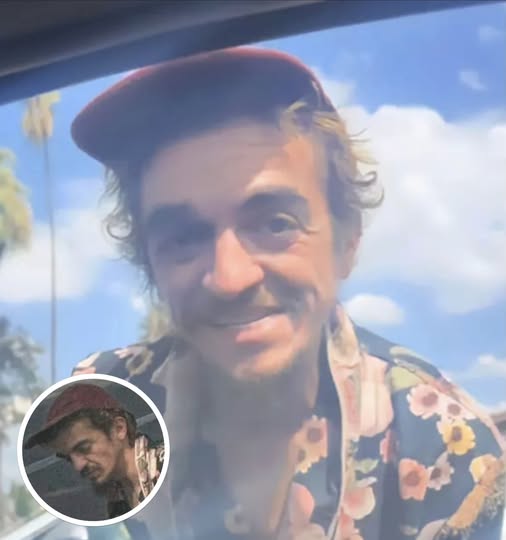For many, it was shocking to reconcile the energetic kid from television with the quiet, withdrawn man sitting alone on a cold sidewalk. Fans flooded the comments with memories — favorite episodes, his iconic rapid-fire monologues, and old interviews that once showed him full of life. It was a sobering reminder that fame isn’t armor, and childhood stardom often comes with a long shadow.
Moved by the outpouring of compassion, lethallalli decided to take action. She set up a GoFundMe to help him get shelter, food, and basic necessities. According to her, he was overwhelmed — in a good way. He told her he was grateful, that he couldn’t believe people remembered him, and that the kindness meant a lot. In just a short time, the fundraiser gained more than $1,200. Not millions, not a life-changing sum — but the kind of amount that could get someone immediate relief. It looked like the internet was doing something good for once.
Then the story took a left turn.
Another creator, posting under the name didyoucatchthis, shared screenshots claiming to be from Chase’s mother. According to the messages, she wasn’t thrilled about the fundraiser. The alleged mother explained that her son wasn’t just dealing with financial hardship — he was battling significant mental health issues. Her messages painted a picture not of someone who simply needed cash, but of someone in crisis who needed structure, treatment, and professional intervention.
“Yes, Tylor needs medical attention, not money,” the message read. “He refuses it. Money would not be a benefit to him. He loses phones, can’t manage money or his medications by himself.”
The tone of the message wasn’t angry, just exhausted — the voice of someone who’d been trying to help a loved one who keeps slipping away. It ended with something that broke the hearts of everyone watching from behind their screens: “He is a good, sweet kid. But he does need medical help.”
After that, the entire narrative around the fundraiser shifted. People weren’t angry — they were conflicted. They wanted to help, but no one wanted to unintentionally make things worse. For anyone who’s had a family member struggle with addiction or mental illness, the situation felt painfully familiar. Compassion, no matter how well-intentioned, can sometimes backfire.
To her credit, lethallalli didn’t try to argue, defend, or stir drama. She paused the fundraiser and offered to give the donations directly to Chase’s family instead. She said she only wanted to do what was best for him. The alleged mother thanked her but cautioned that even giving him the money directly “could possibly hurt him.”
That sentence lingered. It hit harder than any viral video could.
After fans learned more about Chase’s struggles, many began digging deeper. Some found an old YouTube channel under his name. It didn’t feature acting clips or nostalgia reels. Instead, it was a raw collection of self-recorded videos where he spoke openly about bipolar disorder, depression, and the weight of living inside a mind that didn’t always cooperate. In one video, he talked about feeling “scared,” “lost,” and unsure of how to keep going. The tone wasn’t dramatic — it was earnest. Honest. Painfully human.
Others found social posts from years past that hinted at long-term instability — abrupt disappearances, sporadic updates, and attempts at vlogging that never lasted more than a handful of posts. All the signs of someone fighting battles far away from the spotlight.
By the time the dust settled, the internet wasn’t just sad — it was heartbroken. People weren’t gossiping or mocking. They were mourning the loss of stability for someone who had once been part of their childhood memories. They were grieving a life that seemed to unravel quietly while no one was watching.
Comments across multiple platforms reflected the same sentiment:
“This breaks my heart. He made my childhood better.”
“I didn’t expect this to hit me so hard.”
“I hope he gets real help. Not just money — help.”
“This happens too often to former child stars. We need to talk about it.”
And that last point stuck with people. Chase wasn’t the first. Not by a long shot. The entertainment industry has a long record of shining bright lights on children, then leaving them in the dark as adults when they no longer fit the mold. Structure disappears. Support systems collapse. Fame evaporates. And many are left to navigate adulthood without the tools they need.
Right now, the details of Chase’s condition remain unconfirmed. His family hasn’t released any formal statements. No agencies have stepped in. There’s no official diagnosis, no verified timeline, no clear picture of what happened between his years on television and the footage captured on an LA street. What’s undeniable is the emotional impact — people cared. People still do.
Maybe the most important takeaway from this whole situation isn’t the shock of seeing a former child actor homeless. It’s the reminder that mental illness doesn’t care who you used to be. It doesn’t care how many fans you had. It doesn’t care that you once made millions of kids laugh.
It can happen to anyone.
And sometimes, the best help isn’t a viral fundraiser. Sometimes it’s long-term care, family support, and treatment that can’t be organized through a donation link.
For now, fans can only hope that Tylor Chase gets the medical attention, stability, and compassion he needs — not just from strangers online, but from the systems built to protect people who fall through the cracks.
As one comment put it perfectly:
“He made us smile. I hope the world gives him a reason to smile again.”

